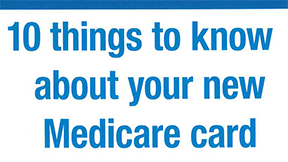 10 Things to Know About Your New Medicare Card
10 Things to Know About Your New Medicare Card
Background: As dictated by 2015 legislation, the Social Security Administration (SSA) will begin the roll-out of new Medicare cards without the use of Social Security numbers. This is help prevent identity theft as Medicare has used Social Security numbers since its inception on your Medicare cards.
The following list is from Centers for Medicare and Medicaid services (CMS).
- Mailing takes time. Your card may arrive at a different time than your friend’s or neighbor’s.
- Destroy your old Medicare card: Once you get your new Medicare card, destroy you old Medicare card and start using your new card right away.
- Guard you card: Only give your new Medicare number to doctors, pharmacists, other health care providers, your insurers, or people you trust to work with Medicare on you behalf.
Our comments: For some reason the CMS in its publication avoids mentioning insurance agents. When filling out an application for a Medicare supplement, Medicare advantage, or a Part D Rx plan, we must put down your Medicare number on the application.
- Your Medicare number in unique: Your care has a new number instead of your Social Security number. This new number is unique to you.
- Your new card is paper: Paper cards are easier for many providers to use and copy, and they save taxpayers a lot of money. Plus, you can print your own replacement card if your need one.
Our comments: Some people laminate their card. Technically, that may be a no-no, but obviously people do it anyway. For sure, make a photocopy of your new Medicare card. You could carry the copy with you and keep your government issued one safely at home.
- Keep you new care with you: Carry your new card and show it to your health care providers when you need care.
Our comments: The same as number five. We have seen some old paper cards so worn that they were virtually unreadable. There’s the wisdom in making a copy.
- Your doctor knows it’s coming: Doctors, other health care providers and facilities will ask you for your new Medicare care when you need care.
- You can find your number: If you forget your new card, you, your doctor or other health care provider may be able to look up you Medicare number online.
Our comments: Again, carry a copy or even multiple copies. Keep one in your car or other backup location. Since there is no SS# on the card, it will be virtually useless to an identity thief.
- Keep you Medicare advantage card: If you’re in a Medicare advantage Plan (like an HMO or PPO, your Medicare advantage Plan ID card is you main card for Medicate—you should still keep and use it whenever you need care. However, you also may be asked to show your new Medicare card, so you should carry this card, too.
Our comments: Back in 2006 when Medicare advantage plans ramped up, the companies were insistent that you SS numbers NOT be used on their ID cards.
- Help is available: If you don’t get your new Medicare card by April 2019, call 1-800-Medicare (1-800-633-4227). TTY users can call 1-877-486-2078. End of the CMS document
Avoid the Scammers: We have reprinted some of the tips from Ron Iverson concerning scammers. They are as follows:
First, scammers are calling Medicare recipients, sometimes identifying themselves as Medicare or “government” officials and telling them that the new cards are coming out, but that they will have to send $30-50 to get the new cards. That is bogus—there is no charge for the new cards—and CMS/Medicare does not call people—it only uses the U.S. Postal Service to communicate.
The second technique is for the scammer to say that he has a Medicare Advantage Prescription Drug Plan available, but then request personal Medicare information so that the new plan can be utilized. This is also bogus. Whatever you do, do not fall for this. Medicare information is personal, and the scammers simply use it for other nefarious activities.
So, we don’t know when or how the scammers will spring into operation in your area, but if you receive one of these calls, just hang up and report the activity with a call to 1-800-Medicare (800-633-4227). And…above all, do not feel pressured to respond to any of these calls—the scammers are well-trained in intimidation and persistency. Don’t fall for it. End